

The European Union’s Common Agricultural Policy and Developing Countries: the Struggle for Coherence - Journal of European Integration - Volume 30, Issue 3. Europe’s Common Agricultural Policy (CAP) has long been criticized as an outstanding example of policy incoherence with development objectives.
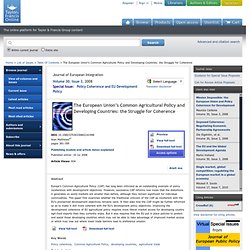
However, successive CAP reforms now mean that the distortions it generates on world markets are smaller than before, although they remain significant for individual commodities. This paper first examines whether the traditional criticism of the CAP as incoherent with the EU’s proclaimed development objectives remains valid. It then asks how the CAP might be further reformed so as to make it still more coherent with the EU’s development policy objectives.
Improving the development coherence of EU agricultural policy requires more liberal market access for developing country agri‐food exports than they currently enjoy. Key Words Related articles View all related articles. Www.tni.org/sites/www.tni.org/files/cappaperfinal-web.pdf. Tierra arrasada: soja en Paraguay y en Brasil. Soya imports ‘fuelling EU factory farms’ THE EU’s increasing reliance on soya imports is ‘fuelling Europe’s factory farms’, damaging the environment and driving down food quality, according to a new report published today.
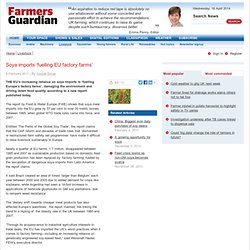
The report by Food & Water Europe (FWE) shows that soya meal imports into the EU grew by 57 per cent to over 20 metric tonnes between 1995, when global WTO trade rules came into force, and 2007. Entitled ‘The Perils of the Global Soy Trade’, the report claims that the CAP reform and decades of trade rules that ‘dismantled or restructured farm safety net programmes’ have made it difficult to raise livestock sustainably in Europe. Nearly a quarter of EU farms, 1.7 million, disappeared between 1995 and 2007 as sustainable production based on domestic feed grain production has been replaced by ‘factory farming’ fuelled by the ‘escalation of dangerous soya imports from Latin America’, the report claims.
Eeas.europa.eu/bolivia/csp/07_13_en.pdf. Eeas.europa.eu/paraguay/csp/07_13_en.pdf. Datos Soja Paraguay CLAES. Roundup ready soybean in Latin America: a machine of hunger, deforestation and socio-ecological devastation. Fileadmin/fdcl/Publikationen/Sojarepublik-Paraguay-Reto-Sonderegger-FDCL.pdf. Www.weltagrarbericht.de/fileadmin/files/BUND_soja_fleisch_agrosprit_studie_2008.pdf.
Scientific Facts on Agriculture & Development. Home » Agriculture » Level 1 Context - Agriculture is closely linked to many concerns, including biodiversity loss, global warming and water availability.
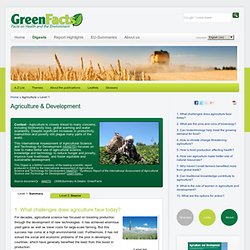
Despite significant increases in productivity, malnutrition and poverty still plague many parts of the world. TOOLS. European Commission : Trade : Economic sectors. Goods and services produced in the EU are traded around the globe but their trade can be affected by various aspects of trade policy, such as import tariffs, regulation or discrimination against foreign suppliers.
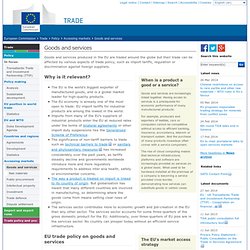
When is a product a good or a service? Goods and services are increasingly linked together. Having access to services is a prerequisite for economic performance of many manufactured products. For example, producers and exporters of textiles, cars or computers cannot be competitive without access to efficient banking, insurance, accountancy, telecom or transport system. And the purchase of many products nowadays often comes with a service component. The rise of cloud computing means that technical infrastructure, platforms and software are increasingly provided as services on a global basis.
Why is it relevant? The EU is the world's biggest exporter of manufactured goods, and is a global market leader for high-quality products. The EU's market access strategy 1. European Commission : Trade : Documents and publications. European Commission : Trade : Agriculture. Trade and agriculture – an overview of eu imports and exports. European Commission : Trade : Statistics (Bilateral relations) Main economic indicators, GDP by sector, trade in goods, trade in commercial services, foreign direct investment, imports and exports with the world, ranking, trade balance.
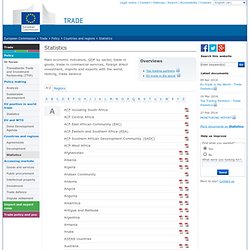
Listings beginning with the letter A ACP including South Africa PDF Detailed view ACP Central Africa ACP East African Community (EAC) ACP Eastern and Southern Africa (ESA) ACP Southern African Development Community (SADC) ACP West Africa Afghanistan. Legal proposals for the CAP after 2013 - Agriculture and rural development. Cookies This site uses cookies to offer you a better browsing experience.
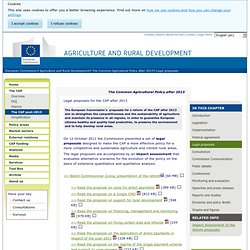
Find out more on how we use cookies and how you can change your settings. Agriculture and rural development Accessibility tools Service tools Language Navigation path. Towards a Common Agriculture and Food Policy 2013 within a food sovereignty framework - Coordination Européenne Via Campesina. Towards a Common Agriculture and Food Policy 2013 within a food sovereignty framework 1.
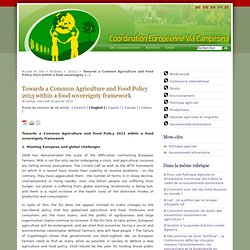
Meeting European and global challenges 2009 has demonstrated the scale of the difficulties confronting European farmers. Milk is not the only sector undergoing a crisis, and agricultural incomes are falling almost everywhere. The current CAP as well as the WTO framework on which it is based have shown their inability to resolve problems ; on the contrary, they have aggravated them : the number of farms is in steep decline, unemployment is rising rapidly, over one billion people are suffering from hunger, our planet is suffering from global warming, biodiversity is being lost, and there is a rapid increase in the health costs of the dominant modes of production and consumption. In spite of this, the EU does not appear inclined to make changes to the neo-liberal policy that has globalised agriculture and food.
Ensure access to food for all people. Trade, Growth and World Affairs - the brochure. CAP2020 - Debating the Future of the Common Agricultural Policy. This study identifies the scale of funding needed annually to achieve environmental outcomes through agricultural and forestry management by 2020 from the EU Budget.
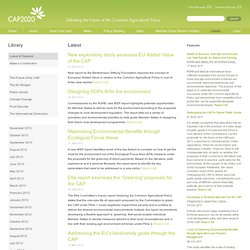
Based on an assessment of scale and nature of farm and forestry management needed to meet the EU’s environmental priorities, the study identified the costs of addressing these priorities through incentives for largely voluntary agricultural and forestry management in the EU-27. It covers the full range of environmental issues linked to rural land management including the protection and enhancement of biodiversity, water quality and quantity, soil, landscape, forest protection and climate change adaptation and mitigation. It includes case studies, providing context specific cost data for three particular environmental issues – arable farmland birds, HNV farmland and soil conservation in Southern Spain. Read in full. Die Debatte über die EU Agrarreform. Enrd.ec.europa.eu/app_templates/filedownload.cfm?id=FE667808-ABC1-3562-FEDB-2A3F7DB09295.
Ernährungs-Souveränität. STAT. The State of Agricultural Commodity Markets. The State of Agricultural Commodity Markets 2009 is the third issue of a new biennial publication that is intended to expand FAO's existing series of “The State of …” reports.
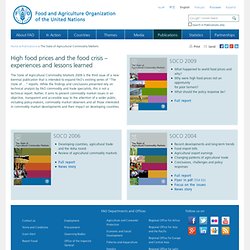
While the findings and conclusions presented rely on technical analysis by FAO commodity and trade specialists, this is not a technical report. Rather, it aims to present commodity market issues in an objective, transparent and accessible way to the attention of a wider public, including policy-makers, commodity market observers and all those interested in commodity market developments and their impact on developing countries. What happened to world food prices and why?
Why were high food prices not an opportunity for poor farmers? What should the policy response be? Eu Trade in the World - Trade Statistics. Top Trading Partners - Trade Statistics. Paraguay - Trade Statistics. EU agriculture policy 'still hurting farmers in developing countries' Despite the decline in subsidies, the common agricultural policy still absorbs almost half the EU budget.
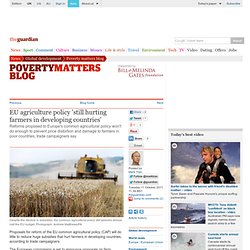
Photograph: Andrew Matthews/PA Proposals for reform of the EU common agricultural policy (CAP) will do little to reduce huge subsidies that hurt farmers in developing countries, according to trade campaigners. The European commission is set to announce proposals on farm subsidies this week, but leaked documents show that in real terms the CAP budget is set to rise from €330bn in 2000-07 to €371bn for 2007-13. The documents obtained by the Trade Justice Movement suggest that total spending for 2014-20 will increase further, to €435.6bn. European support to farm incomes has fallen substantially over the last 20 years. High commodity prices, which automatically push down income support, as well as 25 years of CAP reform have slashed EU spending on agriculture. Britain believes the proposals do not go far enough.
Trade campaigners have expressed concern at the impact on poor countries. CAP provides another bumper payout for landowners. Forget the dodgy bankers. The people who have consistently received the most generous handouts from the public purse over the last 30 years are the big landowners. Teachers, the police and the others are preparing for savage job cuts, tax rises and an age of economic austerity, but a very few people who do nothing more than own land are being handsomely rewarded.
Last month, the watchdog group Farmsubsidy.org collated the EU figures which identify where the €55bn common agricultural policy (CAP) subsidies went in 2009. No big surprises there, with five giant European sugar companies netting €500m between them, a few dairy companies making tens of millions each and the top 1,200 landowners and companies on the continent receiving more than €5bn between them.
Last year, the number of farmers and food companies who received individual payments of more than €1m increased by more than 20%. Few people on either side of the political spectrum have anything good to say about the CAP. WWF-Studie: Fleischkonsum frisst Land - Klima & Wirtschaft - Landwirtschaft - CO2-Handel.de - Das Info-Portal zum Emissionshandel und Klimaschutz. Um den Fleischhunger der Deutschen zu befriedigen, braucht es umgerechnet eine Fläche von der Größe Österreichs.
20100200_landwirtschaft_agrarreform_statt_massentierhaltung_broschuere. Maisanbau lässt Grünlandflächen stark sinken - Klima & Wirtschaft - Landwirtschaft - CO2-Handel.de - Das Info-Portal zum Emissionshandel und Klimaschutz. Studie: Deutschlands artenreiche Wiesen- und Weidenlandschaften in Gefahr - Klima & Wirtschaft - Landwirtschaft - CO2-Handel.de - Das Info-Portal zum Emissionshandel und Klimaschutz.
Forsa-Umfrage: Große Mehrheit gegen Spekulation mit Nahrungsmitteln - Klima & Wirtschaft - Landwirtschaft - CO2-Handel.de - Das Info-Portal zum Emissionshandel und Klimaschutz. Berlin - Dass die Nahrungsmittel in benachteiligten Ländern nicht nur auf Grund von Misswirtschaft und Klimawandel existentiell zu teuer werden, sondern auch auf Grund von Spekulationen, gilt als Tatsache. Impact of CAP reform on developing countries - EU Agriculture Policy Reform - Policy Coherence. Measuring the impact of EU agricultural policies means that we must compare the world as it is with how the world would look if these policies were changed.
Policy reforms will influence the level of domestic and world prices for agricultural products, the level and direction of production and trade, and ultimately the level of living standards and the numbers of people living in poverty in developing countries. To measure by how much the policy reform might lead to changes in prices, production, trade and welfare requires the use of economic models. Empirical studies show that trade-distorting OECD agricultural policies, including those of the EU, lower world prices and reduce exports and welfare in developing countries. The overall impact is of the order of $5-10 billion, with different studies producing different numbers depending on the methodologies used. The potential global gains from comprehensive agricultural trade liberalisation are more significant. Country impacts. Forscher: Welthandel macht Nahrung billiger auf Kosten der Umwelt - Klima & Wirtschaft - Landwirtschaft - CO2-Handel.de - Das Info-Portal zum Emissionshandel und Klimaschutz.
Eine zunehmende weltweite Öffnung der Märkte für landwirtschaftliche Produkte lässt langfristig die Produktionskosten für Nahrungsmittel sinken. Dies geht aber zu Lasten von Umwelt und Klima, etwa wenn Wälder zu Äckern umgewandelt werden. Diesen Zielkonflikt zwischen Ernährung und Klimaschutz zeigen jetzt Berechnungen des Potsdam-Instituts für Klimafolgenforschung (PIK) für die Jahre 2005 bis 2045.
Www.naturland.de/fileadmin/MDB/documents/Bio_Fair/Studie_Oekolandbau__und_Fairer_Handel_in__Entwicklunglaendern.pdf. Www.bukoagrar.de/fileadmin/dateiupload/PDF-Dateien/Agrarinfos/TAZ-Beileger_AgrarInfo_X1A_Druck.pdf. Www.agrarkoordination.de/fileadmin/dateiupload/PDF-Dateien/Futtermittelblues_Heft.pdf. Agrar Koordination: Futtermittel Blues 2.0. Die Klimaproblematik besteht nicht in der Existenz der Wiederkäuer, sondern in der Art ihrer Fütterung und der Massentierhaltung.
Die Bedeutung von Wiesen, Weideflächen, Grassland oder Savannen als CO2-Speicher ist unübertroffen und wird derzeit zu wenig wertgeschätzt. 78 Prozent der Eiweißfuttermittel für die europäische Massentierhaltung stammen aus Importen.